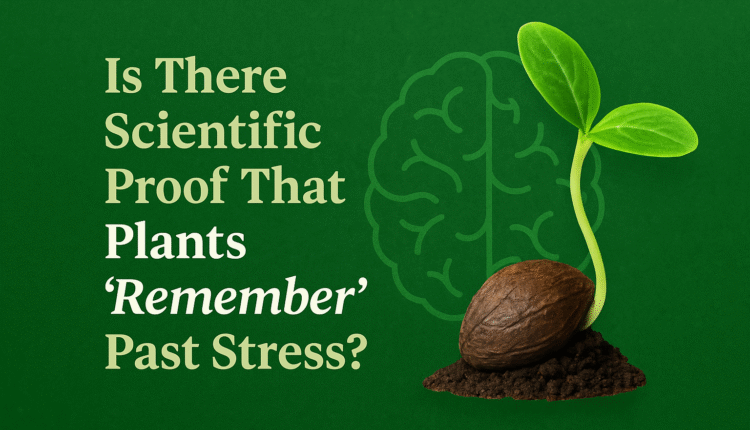Seed Memory: Imagine if your crops could remember the last drought they survived. Imagine if the wheat, rice, or millet you sowed this year carried inside it a memory of past hardships — learning how to better face heat, water shortages, or pest attacks.
This is not just a dream or a myth. Science today shows that plants have a kind of “memory” — not in the way humans do, but at a biological level. When a plant experiences stress, it can adjust how its genes behave, making itself stronger for the next time. Sometimes, these adjustments are passed down to the seeds, meaning the next generation of crops is already a bit more prepared for the challenges ahead.
For Indian farmers, where every monsoon matters and every harvest counts, understanding this plant memory — also called plant epigenetics — could become a game changer. It holds the potential to shape smarter crop choices, improve resilience to climate change, and help small and large farmers alike plan for an unpredictable future.
This article will explain what seed memory really is, how it works in scientific terms, what Indian research is discovering, and most importantly, how you, as a farmer, can start applying this knowledge to make your farm stronger and more future-ready.
Let’s explore the fascinating world of plant memory — where yesterday’s stress could become tomorrow’s strength.
Do Plants Have Memory?
When we think of memory, we usually think of humans or animals — but did you know that plants also have a kind of “memory”?
Recent research in plant epigenetics shows that when plants face stress — like drought, extreme heat, or pest attacks — they can “record” this experience at the cellular level. This “memory” is then passed on to their future growth and sometimes even to their seeds, influencing how the next generation of plants responds to similar challenges.
For Indian farmers dealing with unpredictable monsoons, rising temperatures, and shifting climate patterns, this discovery opens exciting new doors for crop planning and resilience.
What Is Plant Epigenetics?
In simple terms, epigenetics is a process where living organisms change how their genes work — not by changing the genetic code itself, but by turning certain genes on or off depending on environmental signals.
In plants, this means:
• Drought stress can cause certain drought-resistance genes to activate.
Pest attacks can switch on defensive chemical pathways.
• Nutrient shortages can trigger root growth adaptations.
These changes are often stored at the epigenetic level — like putting bookmarks in a recipe book so the plant “remembers” which instructions worked best under stress.
How Does This Memory Help Indian Farmers?
Indian agriculture is highly dependent on weather, especially rainfall. Farmers in states like Maharashtra, Rajasthan, Gujarat, Telangana, and Karnataka know the pain of drought years, while farmers in eastern India like Bihar or West Bengal sometimes face floods.
Here’s why understanding plant memory matters:
• Stronger seedlings: Seeds from drought-stressed parent plants often show higher drought tolerance.
Faster adaptation: Crops “primed” by earlier exposure to stress can respond more quickly to challenges.
• Better resource use: Plants can adjust their growth to prioritize water and nutrient conservation.
For example, rice varieties that survived droughts show increased resilience in subsequent generations. Similarly, some wheat and millet lines grown under repeated heat stress develop more heat-tolerant traits.
Indian Research in Plant Epigenetics
Indian agricultural research centers, such as:
• Indian Agricultural Research Institute (IARI) in Delhi,
International Crops Research Institute for the Semi-Arid Tropics (ICRISAT) in Hyderabad, and
• Punjab Agricultural University (PAU),
are actively studying how stress memory can help improve crops like rice, wheat, maize, millets, and pulses.
For example:
- ICRISAT’s work on pearl millet (bajra) under dry land conditions focuses on selecting lines that carry stress memory.
- IARI researchers are investigating heat-stressed wheat varieties to ensure they remain productive even when late-season temperatures rise.
Can Farmers Use This Knowledge Today?
While lab research is ongoing, here are practical tips Indian farmers can start thinking about:
| Strategy | What Farmers Can Do |
| Seed Selection | Save seeds from crops that survived tough conditions (drought, pests) for replanting. |
| Diversified Cropping | Use multi-crop or mixed cropping systems to allow stress-resilient varieties to emerge. |
| Controlled Stress Priming | Some experts suggest mild stress (e.g., regulated water deficit) in nurseries to “prime” plants for future resilience. |
| Partner with Scientists | Engage with Krishi Vigyan Kendras (KVKs) and agricultural universities to access improved, epigenetically resilient seeds. |
How Does Seed Memory Work?
You might wonder: How can a plant, which has no brain, remember anything?
Well, the answer lies deep inside its cells — in the way its genes behave under stress.
Let’s break it down step by step.
1. Chemical Signals Alert the Plant to Danger
When a plant faces stress — like too little water, extreme heat, pest attack, or poor soil — it immediately detects these changes through chemical signals inside its body.
For example:
• If water is scarce, the plant produces a hormone called abscisic acid (ABA), which tells the leaves to close their pores to prevent water loss.
• If pests are attacking, the plant produces jasmonic acid or salicylic acid, which triggers defensive chemicals to fight off the attackers.
These chemical messengers are like alarm bells ringing across the plant, telling it, “We are in trouble — let’s respond!”
2. Epigenetic Changes Adjust Gene Expression
Instead of changing the actual DNA sequence (which would take generations), the plant adjusts how its genes are used.
This is done through:
• DNA methylation: Adding tiny chemical tags (methyl groups) onto the DNA, turning certain genes on or off.
• Histone modification: Changing the proteins (histones) around which DNA is wrapped, making some areas more or less active.
Think of this like bookmarking important pages in a manual — the plant doesn’t rewrite its genetic book, but it marks the pages it needs to use to survive.
3. These Adjustments Pass on to New Cells — and Sometimes Seeds
Once the plant has made these adjustments, they don’t disappear overnight.
As the plant grows and its cells divide, the epigenetic changes are often passed on to the new cells, ensuring the whole plant benefits.
Even more fascinating:
In some cases, these “bookmarks” are preserved inside the seeds, meaning that when the next generation of plants grows, they already carry these stress-response settings.
So, a seed from a drought-stressed wheat plant may sprout into a plant that is better prepared for water scarcity, even if it has never faced drought before.
4. The Next Generation Is Quicker, Stronger in Facing Similar Stress
Because these stress memories are passed on, the next generation of plants:
- Reacts faster when facing similar threats.
- Activates the right defense mechanisms more efficiently.
- Uses its resources more wisely, knowing which parts of its system need the most attention.
This is nature’s way of giving plants a head start, especially in regions like India where environmental challenges are common.
However, farmers should remember:
- Not all stress memories are permanent. Some epigenetic changes fade after a few generations if the stress disappears.
- Too much stress can harm seed quality. If a plant is pushed to the extreme, it may produce poor or weak seeds. That’s why balance is crucial — mild or moderate stress may build resilience, but extreme stress can be damaging.
- Not all traits are passed on. Some plant responses are short-term and only help the current generation.
- Epigenetic memory is not a magic bullet — it complements, not replaces, good agronomic practices.
- Seed certification standards often don’t capture epigenetic traits yet.
- More field trials and on-ground experiments are needed to translate lab findings into usable farm solutions.
Why Does This Matter for Indian Agriculture?
India’s farmers stand at the frontline of climate change. Erratic monsoons, rising temperatures, unseasonal rains, and frequent droughts are no longer rare events — they are becoming part of regular farming life. In this context, the idea of plant memory offers a powerful tool for farmers to prepare their fields for the future.
Understanding how plants “remember” past stress allows Indian farmers to make smarter decisions at every step:
– Seed selection: Instead of buying seeds blindly, farmers can save seeds from crops that survived tough seasons — these seeds may carry epigenetic resilience, giving the next generation a better chance.
– Stress priming: By applying mild, controlled stress (like slightly reducing water supply or exposing seedlings to moderate heat), farmers can “train” young plants to be tougher, making them more adaptable when real stress hits.
– Supporting research: Farmers who work closely with Krishi Vigyan Kendras (KVKs) or agricultural universities can benefit from improved varieties developed through epigenetic research, ensuring that their fields stay productive even under shifting weather patterns.
In short, plant memory is a natural insurance policy. By using it wisely, Indian agriculture can become more climate-resilient, helping both small and large farmers secure their livelihoods in an increasingly unpredictable world.
Final Thoughts: Towards Resilient Indian Agriculture
The idea that plants remember past stress — not just in their own growth but in their seeds — opens fascinating new avenues for Indian agriculture.
By working hand-in-hand with scientists, farmers can be part of the next wave of climate-smart farming: using nature’s own memory system to build stronger, more resilient crops for a challenging future.
So next time you see your fields bounce back after a hard season, remember — your crops might just be learning, adapting, and getting stronger.
Contact us – If farmers want to share any valuable information or experiences related to farming, they can connect with us via phone or whatsapp at 9599273766 or you can write to us at “[email protected]”. Through Kisan of India, we will convey your message to the people, because we believe that if the farmers are advanced then the country is happy.
You can connect with Kisan of India on Facebook, Twitter, and Whatsapp and Subscribe to our YouTube channel.



